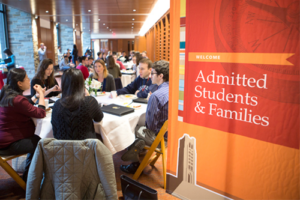This website uses cookies
We use cookies to ensure that we give you the best experience on our website. If you continue to use this site we will assume that you are happy with it.
 They came from all over the country, bearing questions. They’d already done their research, reading thousands upon thousands of words, and by the time these admitted students arrived at Myron Taylor Hall on March 18, they were ready to find out for themselves: What is Cornell Law really like?
They came from all over the country, bearing questions. They’d already done their research, reading thousands upon thousands of words, and by the time these admitted students arrived at Myron Taylor Hall on March 18, they were ready to find out for themselves: What is Cornell Law really like?
“It would be a missed opportunity not to ask every question you’re looking to address, regardless of whether we can answer every one of them 100 percent,” said Monica Ingram, leading her first Admitted Students Day since becoming associate dean of admissions and financial aid in July 2015. “Come with an open mind. Take this opportunity to ask about the issues that are shaping your decision, and get the answers you richly deserve.”
So they did, starting with a registration breakfast at Myron Taylor Hall, then moving through a series of panel discussions on student services, clinics, clerkships, externships, and careers. They attended first-year classes in contracts and civil procedure, joined faculty and administrators for an evening mixer in The Commons, and closed the night with an after party at Lot 10, complete with Latin dancing and street food from Luna Kitchen.
“I’m going to make my decision based on the experience I have today,” said Josh Pirutinsky, who works at a start-up in Rockland County, taking a lunch break between meetings. “I’ve been talking to alumni. Speaking to friends here at Cornell, asking what they think about it. Visiting schools, seeing what they have to offer. Trying to gauge their strengths, figure out how they’re going to hone our skills, and determine which one is going to offer the proper fit. Does it seem like a happy marriage or not?”
For Akilesh Shastri, who’s been studying chemical engineering at Rensselaer Polytechnic Institute, the questions are about whether he’d be able to combine a J.D. with an M.S. in engineering, and whether he’d be able to use his joint degrees to build a career in patent law. “It’s nice to see that students here know each other, because I’ve visited bigger law schools where they don’t, and it can be very off putting,” said Shastri, waiting for the start of Jeffrey Rachlinski’s contracts class. “I like the small-school feel, but I still have to see what classes are like. How do professors communicate? Do they lecture? Or is class more like a discussion?”
Coming from Los Angeles, where he works in public policy, Leon Cain spent part of the morning walking around campus, trying to get a feel for Cornell before attending a presentation on careers with John DeRosa, Karen Comstock, and Elizabeth Peck. “Everyone talks about the sense of community here, and you really do feel that,” said Cain, who’s focused on finding the right intellectual environment. “You can tell that people like to be here and to have real, warm relationships with one another. Community is really important to me, to see how people interact. The question I’m asking myself, more than anything else, is whether I see myself fitting into this community. Is it the right fit for me?”
And for at least one person that day, there was no question at all. “It is a very easy decision for me,” said Jie Gao, who lives an hour away from campus, where she balances raising a family and working as a patent agent. “This is my dream school.”